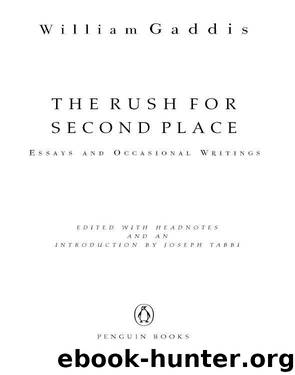The Rush for Second Place by William Gaddis

Author:William Gaddis
Language: eng
Format: epub
Publisher: Penguin Publishing Group
OLD FOES WITH NEW FACES
PRESENTED AT A SYMPOSIUM “The Writer and Religion,” organized by William Gass for the International Writers Center at Washington University in St. Louis, October 1994. The essay appeared a year later in The Yale Review and was reprinted with the other symposium essays and audience commentary in a collection from the Southern Illinois University Press (2000).
OLD FOES WITH NEW FACES
I have taken my text from a turn on the subtitle of Charles Kingsley’s nineteenth-century novel Hypatia, or New Foes with an Old Face, the tale of a liberated woman of great beauty, eloquence, modesty, and such brilliance that she came to lead the Christian school of Neoplatonism in fourth-century Alexandria. Her leanings, however, were toward the intellectual rather than the mystical side of Neoplatonic thought, and we are told that when she pushed things too far by taking the pagan prefect of the city for her lover she was torn from her chariot and dragged to the Caesareum, lately become a Christian church, where she was stripped naked, done to death with oyster shells, and burnt by a fanatical Christian mob. Her writings have not survived.
And so the task before us is scarcely a new one. We may think of it as nearer, in the words of T. S. Eliot, to the “fight to recover what has been lost / And found and lost again and again: and now, under conditions / That seem unpropitious.” We are asked to explore the relationship between the writer and “one of the earliest and most universal activities of the human mind,” as Carl Jung has labeled it, “the eternal problem of religion.”
Considering the enormity of this enterprise, I will narrow the focus of my remarks at the outset to my own pursuits. By writers, I assume we mean writers of fiction; by religion, the one I have barked my shins against for over half a century in one or another of its avatars, to borrow an epithet (as Christianity itself has never hesitated to do when it has served its purposes). Rather than initiating our undertaking with a confrontation—I am sure we will see plenty of that—I propose to extend the hand of fellowship from the criterion central to both: that which constitutes poetic faith for the writer in Coleridge’s familiar “willing suspension of disbelief,” and for the religionist the leap of faith enshrined in Augustine’s misquotation of Tertullian, “Credo quia absurdum.”
In other words, we are all in the same line of business: that of concocting, arranging, and peddling fictions to get us safely through the night.
Religion, as defined by Jung, is the term that “designates the attitude peculiar to a consciousness which has been altered by the experience of the numinosum”—the supernatural, that which is mysterious, spiritually inhabited, impossible to describe or to understand. In more mundane terms it might be seen as analogous to a legal fiction, in which the court, obliged to support its decision in resolving a controversy, makes and adopts a factual assumption which
Download
This site does not store any files on its server. We only index and link to content provided by other sites. Please contact the content providers to delete copyright contents if any and email us, we'll remove relevant links or contents immediately.
| African | Asian |
| Australian & Oceanian | Canadian |
| Caribbean & Latin American | European |
| Jewish | Middle Eastern |
| Russian | United States |
4 3 2 1: A Novel by Paul Auster(12356)
The handmaid's tale by Margaret Atwood(7732)
Giovanni's Room by James Baldwin(7303)
Asking the Right Questions: A Guide to Critical Thinking by M. Neil Browne & Stuart M. Keeley(5742)
Big Magic: Creative Living Beyond Fear by Elizabeth Gilbert(5728)
Ego Is the Enemy by Ryan Holiday(5395)
The Body: A Guide for Occupants by Bill Bryson(5066)
On Writing A Memoir of the Craft by Stephen King(4921)
Ken Follett - World without end by Ken Follett(4707)
Adulting by Kelly Williams Brown(4554)
Bluets by Maggie Nelson(4535)
Eat That Frog! by Brian Tracy(4502)
Guilty Pleasures by Laurell K Hamilton(4428)
The Poetry of Pablo Neruda by Pablo Neruda(4081)
Alive: The Story of the Andes Survivors by Piers Paul Read(4011)
White Noise - A Novel by Don DeLillo(3992)
Fingerprints of the Gods by Graham Hancock(3980)
The Book of Joy by Dalai Lama(3962)
The Bookshop by Penelope Fitzgerald(3829)
